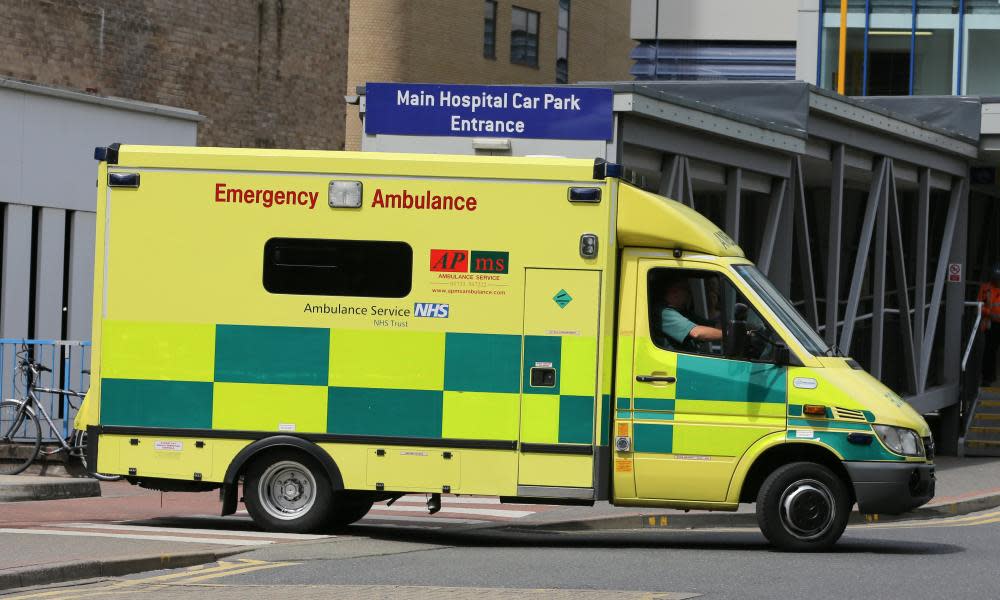Ambulance crisis 'led to 20 deaths in east England over Christmas'

Twenty people died while waiting too long for ambulances in the east of England after the ambulance service there failed to seek outside help during the busy period over Christmas, a Labour MP has said, citing a whistleblower.
Clive Lewis, the MP for Norwich South, used a point of order in the Commons to highlight what he said was an “exceptionally serious issue” with the East of England ambulance service, highlighted by the whistleblower.
The ambulance service became critically overstretched from 19 December, and senior managers wanted to move into what is called Reap 4, the fourth stage of the resource escalation action plan, which involves seeking outside help, Lewis told MPs.
Because neighbouring ambulance services were also overstretched, the assistance would most likely have come from the armed forces, he said.

Lewis said no decision was taken until 31 December, when a different plan was implemented. Over the period, 20 patients died in incidents when ambulances arrived late, the whistleblower has claimed.
The latest NHS figures show that up to 100,000 patients this winter have had to wait in the back of ambulances for at least 30 minutes because of A&E overcrowding.
In all 104,987 patients brought to hospitals in England have been stuck inside an ambulance, or in parts of hospitals including corridors, for upwards of half an hour.
They have faced long waits because A&E staff, struggling to cope with a surge in demand for care, have been too busy to accept them at the time they arrive. Of the patients affected, almost a quarter – 24,624 – have endured a delay of at least an hour.
Lewis told the Commons that the whistleblower’s claims, if true, raise “serious questions for both the trust and the government as to why Reap 4 was not declared and no aid sought, what potentially avoidable deaths resulted from those decisions, and above all how we avoid that ever happening again”.
A spokeswoman for the ambulance service said it was looking into what had happened and accepted there had been delays over Christmas.
She said: “We recognise that some people experienced a delay in their care over the festive period and we, along with the wider healthcare system, experienced significant pressure.
“We always monitor our demand and capacity and take necessary actions to protect patients, working closely with NHS Improvement and NHS England. The trust has a robust internal process and we are investigating appropriately.
“Since Christmas we have responded to in excess of 50,000 patients. Of those, less than 0.2% of patients have experienced a significant delay.”
A combination of factors are at play. Hospitals have fewer beds than last year, so they are less able to deal with the recent, ongoing surge in illness. Last week, for example, the bed occupancy rate at 17 of England’s 153 acute hospital trusts was 98% or more, with the fullest – Walsall healthcare trust – 99.9% occupied.
NHS England admits that the service “has been under sustained pressure [recently because of] high levels of respiratory illness, bed occupancy levels giving limited capacity to deal with demand surges, early indications of increasing flu prevalence and some reports suggesting a rise in the severity of illness among patients arriving at A&Es”.
Many NHS bosses and senior doctors say that the pressure the NHS is under now is the heaviest it has ever been. “We are seeing conditions that people have not experienced in their working lives,” says Dr Taj Hassan, the president of the Royal College of Emergency Medicine.
The unprecedented nature of the measures that NHS bosses have told hospitals to take – including cancelling tens of thousands of operations and outpatient appointments until at least the end of January – underlines the seriousness of the situation facing NHS services, including ambulance crews and GP surgeries.
Read a full Q&A on the NHS winter crisis
A Department of Health and Social Care spokesman said: “These are serious claims and we urge Mr Lewis to provide the Department of Health and Social Care with evidence to substantiate them as soon as possible. We will of course carefully examine any such evidence and take appropriate action.”
This month it emerged that an 81-year-old woman in Clacton, Essex, was found dead at home after waiting almost four hours for an ambulance from the East of England ambulance service.
Chris Jenkinson, the east of England head of the Unison union, said: “There must be an independent inquiry to establish what went wrong, and whether these tragic deaths could have been avoided.”

 Yahoo News
Yahoo News 
